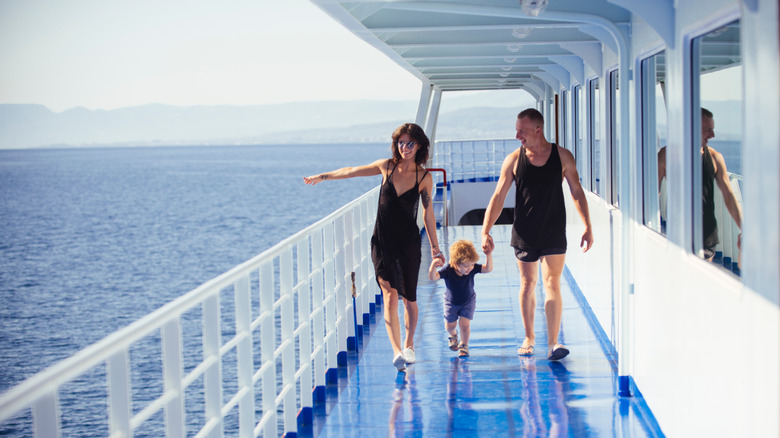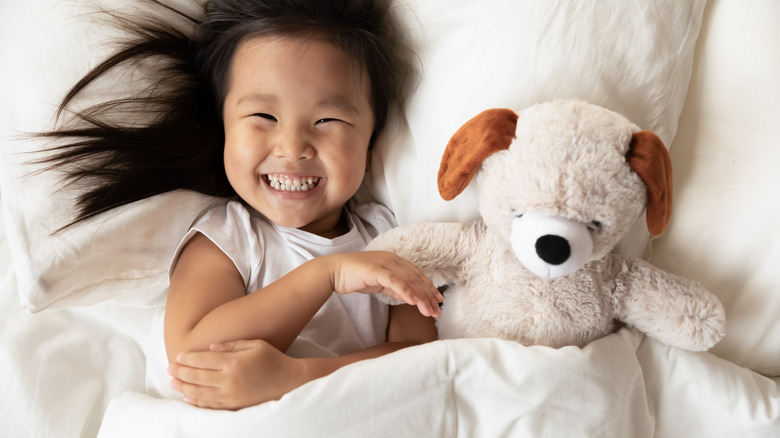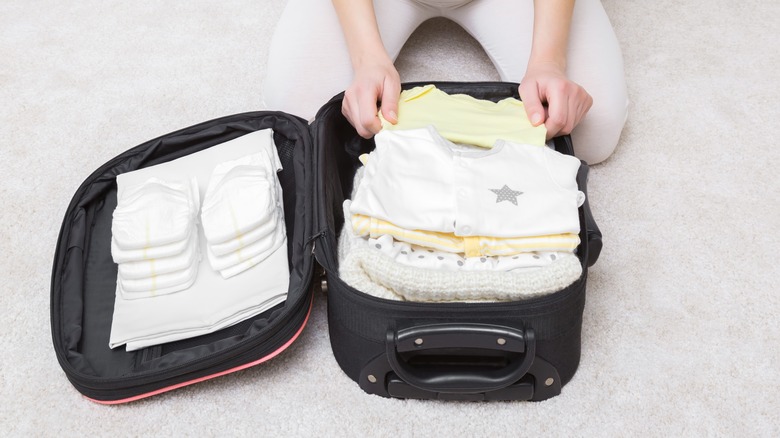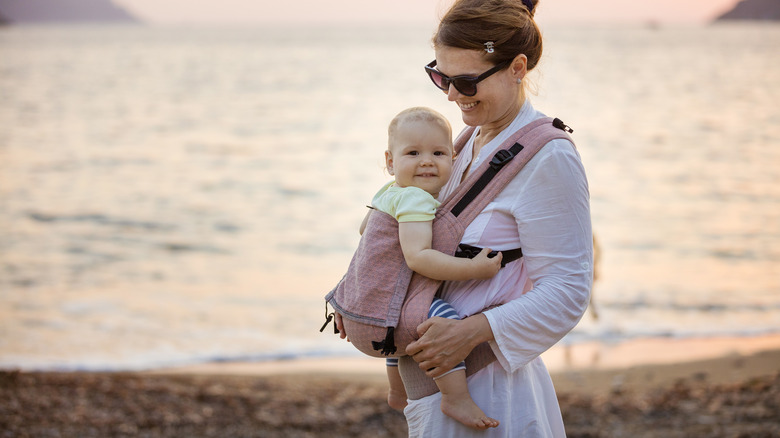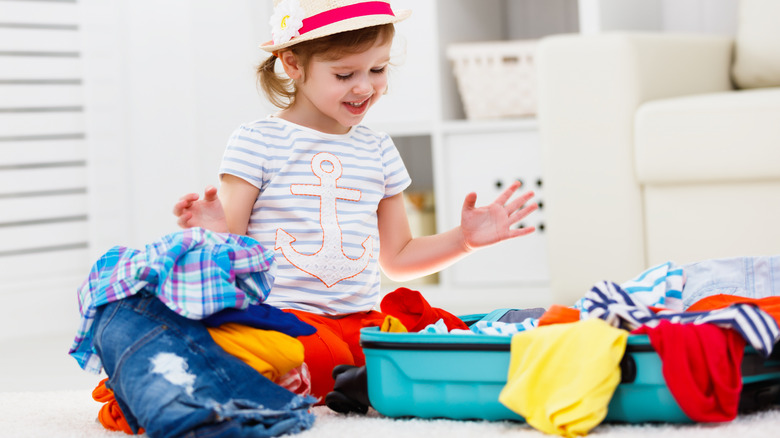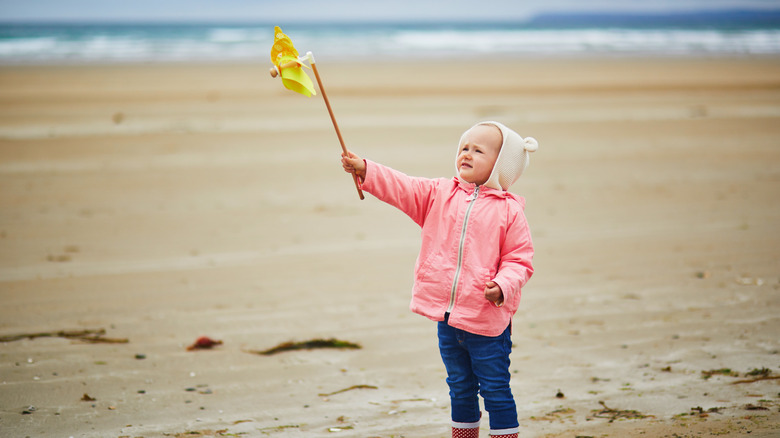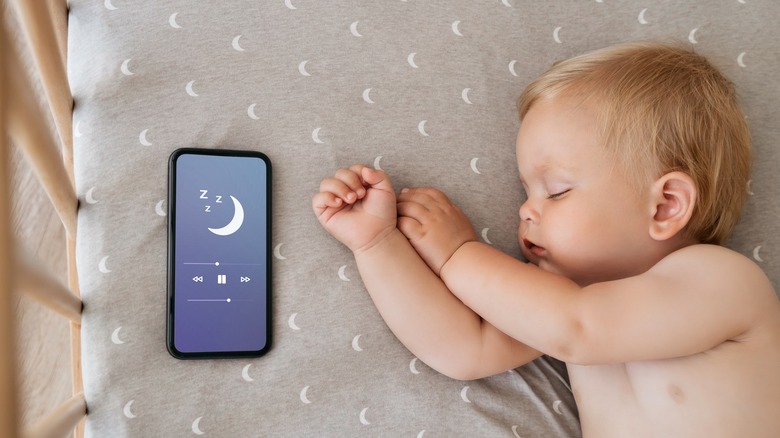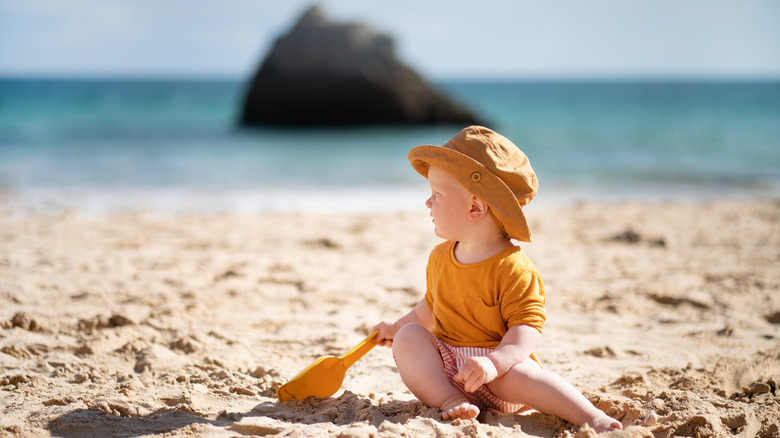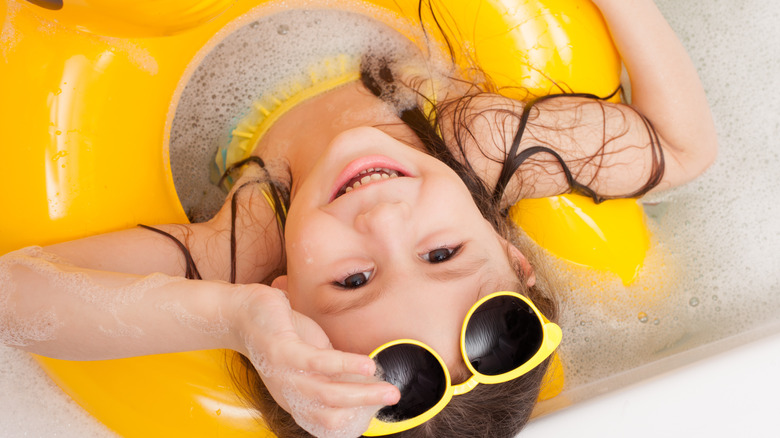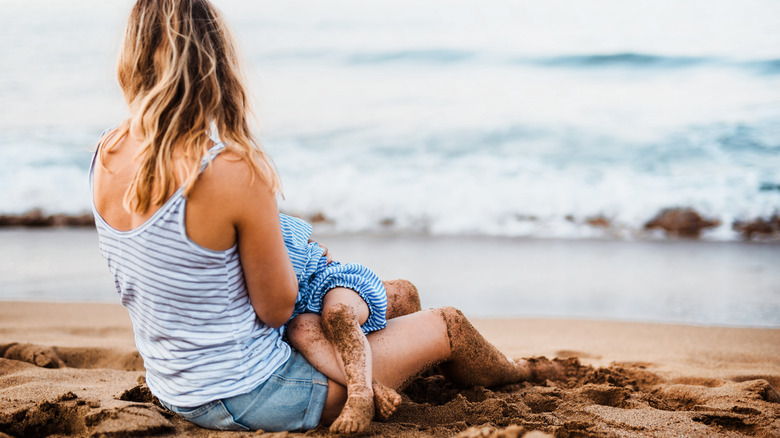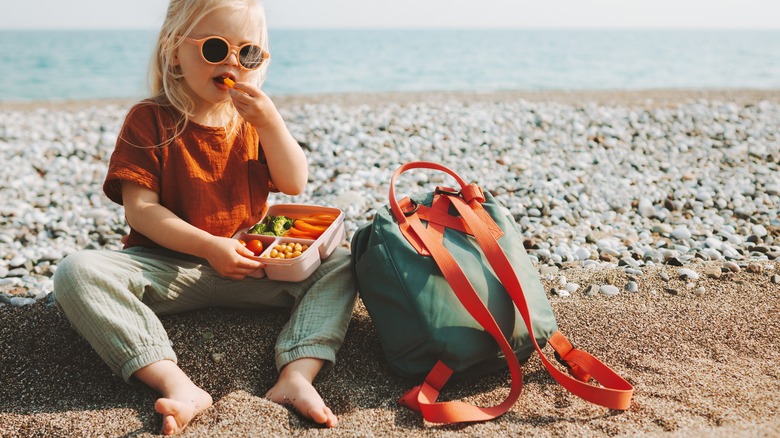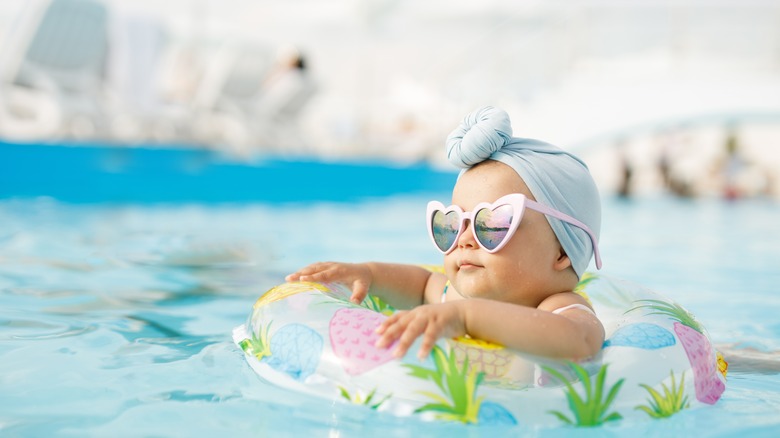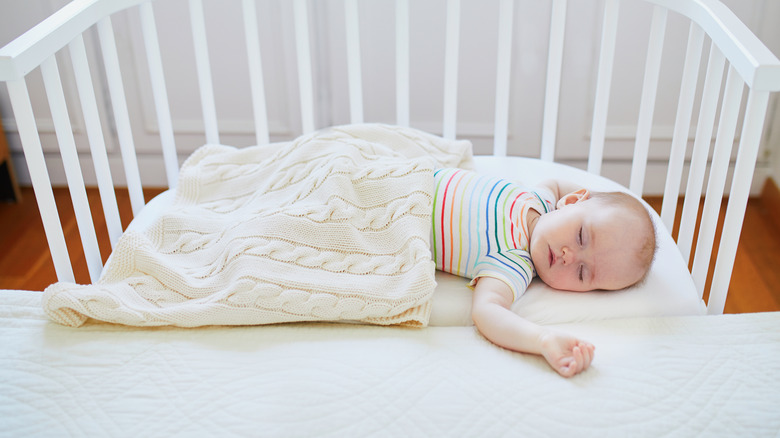The Complete Packing Guide For Your Baby Or Toddler's First Cruise
Becoming a parent doesn't mean the end of your life as an explorer, as there are plenty of ways to travel with a baby and as a whole family. While road-tripping with a toddler is as challenging as it is rewarding, taking a cruise with a baby or toddler is much more simple.
Your baby will need to be at least six months old for most cruises that don't require a passport, and if you're planning a more extensive cruise that crosses the ocean or is a more international destination, then you'll need to wait under your child is at least a year old by the time your ship departs — make sure to check your particular cruise line's policy. Traveling with a baby or toddler who is more mobile and developed than a newborn actually could be a bit more involved than traveling with a baby fresh to this world.
Packing light is typically a positive thing, but don't be afraid to pack extra things you think you will need when packing for your baby, especially if you are a first-time parent and haven't locked down your parenting style or needs quite yet. Don't fret, though, because we are here to help! Our packing guide for cruising with a baby or toddler will help you make all the right packing decisions for a fun-filled family vacation.
Comforts from home
Babies are resilient, and as long as they have their trusted care providers, they can adjust to pretty much anything. However, the transition from being at home to traveling on board a huge cruise ship with different air and motions surrounded by a ton of people is a pretty big one. You can help your little one ease into the big change by bringing some of their favorite items from home. Whether it be a blanket that they've slept with every night since birth or a few toys they enjoy, making sure to pack it and even have it on them while boarding the ship can be a comfort that makes all the difference.
Additionally, if one care provider is not making the journey with you, bringing something with their scent can bring a sense of their presence along for the trip. It may also be helpful to keep a video of that person on hand so that your baby can hear their voice, especially if that care provider sings or reads the child to sleep on a regular basis. Prerecording some songs or stories will help soothe your child if they have a rough transition and helps to keep the missing loved one relevant in their mind as a somewhat active presence during the trip.
So many diapers
You can't count on much once you enter the ever-changing world of parenthood, but the need for diapers is one constant. While the cruise ship may have a store with some necessities, it's wise to not have to rely on them for anything. Yes, it's possible diapers may be available for purchase, but storage is limited on a cruise ship and there may be other passengers onboard who are wanting baby items as well. It's best to pack more diapers that you will need, just in case. The average baby or toddler uses anywhere from six to 10 diapers a day, so it's best to go with something in the upper range – you can probably get away with less if you have an older toddler. Also, don't forget the wipes!
If you are on a cloth diapering journey, we highly recommend you take a break from it during your cruise and pack disposables. While Mother Earth thanks you for lessening your and your baby's carbon footprint, this choice will make life more difficult while onboard a cruise ship. The dirty diapers stacking up in your cabin you'll become a stinky situation sooner than later, so save yourself where you can.
Something to carry your baby
Baby will need to go pretty much everywhere you go as they're too young for kid's club and you'll be exploring quite a bit, so you will need to find the best way to tote around your little one – and trust us, that's not by carrying them in your arms. Strollers are allowed on cruises and can be a great way to bring your baby along everywhere you need to go, and all you really need is a small, light stroller. While this may come in handy on the ship, it will be worth gold once you leave the ship and explore a port town.
Some cruise lines provide strollers that families can use on board and at port, and some do not. If you do not want to worry about packing and dragging your own stroller from home along for the trip, check with your specific cruise to see if they have their own available and if they are limited. Packing your own, of course, ensures that you are granted one and that your little one is comfortable in it.
Baby carriers are also incredibly valuable, as they free your hands, allow your baby to stay snuggled close to you, and can go a long way in easing your mind that your baby is safe in a crowded place. Utilizing a baby carrier, stroller, or both while exploring the ports is the sweet spot for some, but whatever feels most comfortable is the best for you and your family.
Plenty of clothes
Babies and toddlers can go through a good amount of clothes. It's not abnormal for a baby to go through three sets of clothes in a day, and once children get mobile, their clothes are likely to go through the ringer with everything they crawl, run, and play through. You'll likely want to bring plenty of clothes for your baby, and you'll also want to be sure that they are appropriate for the weather. Take a look at what the weather is supposed to be like at all your destinations, and also consider what it'll be like on the ship.
If you're traveling somewhere warm, bring breathable clothing for your child that is easy to layer, as well as warmer clothing for the ship. If your child is walking, you'll need to bring one or two appropriate pairs of shoes as well.
If you don't want your luggage packed down with tiny sets of shirts and pants along with everything else your child will need, bring some portable laundry detergent packs in order to do some light laundry in your cabin's bathroom sink to help reuse some clothing items. Fortunately, tiny human clothes are small enough to dry quickly and not take up too much cabin space when hung up. A lot of cruises do offer laundry services as well, but maybe not often enough for the constant rotation of clothing small children go through.
Protection from the wind
Something a lot of travelers may not consider when taking a baby on a cruise is the wind that may occur once on board. While the long-standing idea that wind causes ear infection if a baby's ears are exposed on a windy day is, fortunately, a myth, it certainly is not comfortable for a baby to have the wind blowing around their faces and ears and it can actually irritate their skin. Even if it is a warm day, covering a baby is still pretty wise if there is a constant breeze or heavy winds.
Whether it's a headband, a hat, or a thin blanket, make sure to pack something that could act as a kind of shelter for your baby from the wind. Depending on your destination, having something that is appropriate for the cold, the heat, or even both would be wise. Cruises cover a lot of area and weather conditions could change drastically as you travel, so it's best to be prepared for whatever may come.
Noise machine
Sleep is one of the most important things to a baby and a new parent. While on vacation especially, you want to up the odds of having a decent amount of rest so that you haven't dumped a bunch of money into a trip that you're dragging through exhausted. A sleep machine or white noise can be beneficial to a child's sleep and especially help them adjust to a new setting. If your child doesn't normally sleep with a noise machine, you may want to start it at home a week or two before you head out. Feel free not to take this tip if you don't want to risk starting a habit that might not be easily stopped once you get home, but the increased sleep you may get just might be worth an added step in the nighttime routine.
If you don't want to take up space with a noise machine, your phone will likely work just fine. You can get an app, download white noise, or even use YouTube to play a sound to soothe your baby. Using your phone for your child's sleep time routine will of course mean that you do not have it, though, and it's perfectly reasonable to not want to give up your communication device for the many hours small children need to sleep.
Protection from the sun
As the care provider, you need to ensure your child doesn't get too much exposure to the sun, which can be especially damaging to their brand-new skin. Fortunately, there are a few ways to help keep your baby out of the sun's harmful rays. It's probably been drilled into you that, while vacationing out in the sun, you need to lather on the sunscreen. The only thing worse than the pain of being sunburnt on vacation is a burnt baby, however, it isn't recommended to apply sunscreen to an infant younger than six months old. Even though your baby will need to be at least six months old if they're on a cruise, you may want to limit its use until they are a little older.
Bringing a hat or two that has full courage and flaps around the neck can help protect them from the sun, especially since a lot of babies don't have a ton of hair to protect their scalps. The sunshade of a stroller can be helpful here as well, or even bringing a little umbrella could be helpful. These sun-blocking items are still useful if you do lather sunscreen on your baby, as the more precautions you take, the less sun exposure your child will get.
Bathing necessities
Something you may not think about when packing for your little one's first cruise is how you will bathe them. Unfortunately, your child is likely too big for the cruise cabin's sink, meaning the most simple solution to the bathing predicament is just out of reach. Most cabins on a cruise ship will also only have a shower unless you choose to upgrade your room, so you can't bank on having an accessible bathtub, either.
Unless you want to hold your little one while taking a shower yourself, which can be tricky, very slippery, and all around not a fun time, we'd recommend bringing your own baby bath. Inflatable baths are ideal for cruises, as they don't take up a ton of room in your pack. Think about sacrificing some packing room for a couple of bath toys as well, because keeping bath time a fun and interactive time goes a long way in making sure your baby has a great vacation as well.
Feeding essentials
If you are traveling with a baby who is under a year old, you'll need to make sure you pack enough formula and bottles if you are not breastfeeding. Some cruises will have formula available to buy, but it's best to come prepared with plenty of formula for your baby's needs. Tap water on a cruise ship is typically safe to drink, but formula is meant to be made with purified water. Bringing distilled water in your carry-on luggage to make bottles is wise, though it does add a decent amount of weight to your bags. Distilled water may be provided by the cruise line, but we would recommend you check before heading out so you know whether you need to pack it.
Breastfeeding, unless your baby is exclusively nursed, will take much more packing space. If your baby takes pumped milk, you'll need to consider everything you need at home for pumping and cleaning the pump parts, as well as bottles and milk storage. Also make sure to bring anything you think will make you the most comfortable nursing or pumping on a cruise ship, whether you like wearing a cover or using a boppy pillow.
Snacks, snacks, and more snacks
Since babies have to be at least six months old on a cruise, they are likely already eating some solids and chances are, your little one snacks out at home — especially if you've got one who is already walking or running around! Luckily, cruises will allow you to bring packaged foods on board. While this doesn't include any homemade food items your little ones may love, you can probably compile a good collection of snacks they'll enjoy over the course of the cruise.
Freeze-dried fruit is a great option, as well as yogurt bites and nuts if you've already introduced them and ruled them out as allergens. Speaking of, it's a great idea to only bring snacks you know your child has already had. While the early introduction of the main allergens is now recommended to help children avoid developing allergies, it's wise to do so when prepared for things to go wrong. You will want to ensure there is little chance of your baby having an allergic reaction when out at sea on a cruise ship, away from major hospitals.
Will your baby need a swimsuit?
If you plan accordingly, yes! Most cruise lines won't allow a baby or child who is not yet potty-trained to swim in the pool. It makes sense, as there are a lot of people who have paid for the chance to have a nice swim and they don't want waste to end up in the pool. However, some cruise lines have a place for younger children and babies to get in the water as well — but it's still important to be mindful of potty time and dirty diapers, though!
MSC Cruises, Disney, and Royal Caribbean are generally all family and small children-friendly cruise lines, but they still only have certain ships that have splash pads and smaller pool areas that are specifically meant for babies and toddlers. If you are set on your child getting to have a fun pool experience, make sure to research your ship to ensure they'll have a place to get in the water.
Be mindful that even though a ship has pools and pads for young children to have fun it doesn't mean that all pools are baby friendly. It's also likely that lifeguards will not be present and water is particularly dangerous for small children – it only takes seconds to drown, so understand that full attention has to be on children in the water., especially in crowded places with plenty of distractions.
What about sleeping arrangements?
Parents, especially new ones, know that sleep is absolutely vital to a happy, healthy baby as well as fully functioning care providers. It can be difficult in perfect conditions to get some much-needed sleep when a baby is involved, and even harder when in a setting like a cruise ship. That's why it's so important to make sure your baby has a comfortable and relaxing sleep situation on board.
Those who co-sleep with their little ones may not be too worried about the sleeping arrangements on the cruise ship, but it's important to remember that beds on a cruise will likely be different than you are used to at home. A lot of cabins have two twin-sized beds that you are welcome to push together, but that may leave you less than thrilled about a safe spot for your little one to sleep.
Some cruise lines will automatically provide a crib or safe sleep space for a baby that is booked for a cruise, but it's best to speak to someone about whether a space can be provided. If a bed for your baby isn't provided or you'd rather bring your own, you can tote in a travel crib. It may be a good idea to bring your baby or toddler's own sheets from home, to help with transitioning into a different space. Also, don't forget their favorite stuffy!
